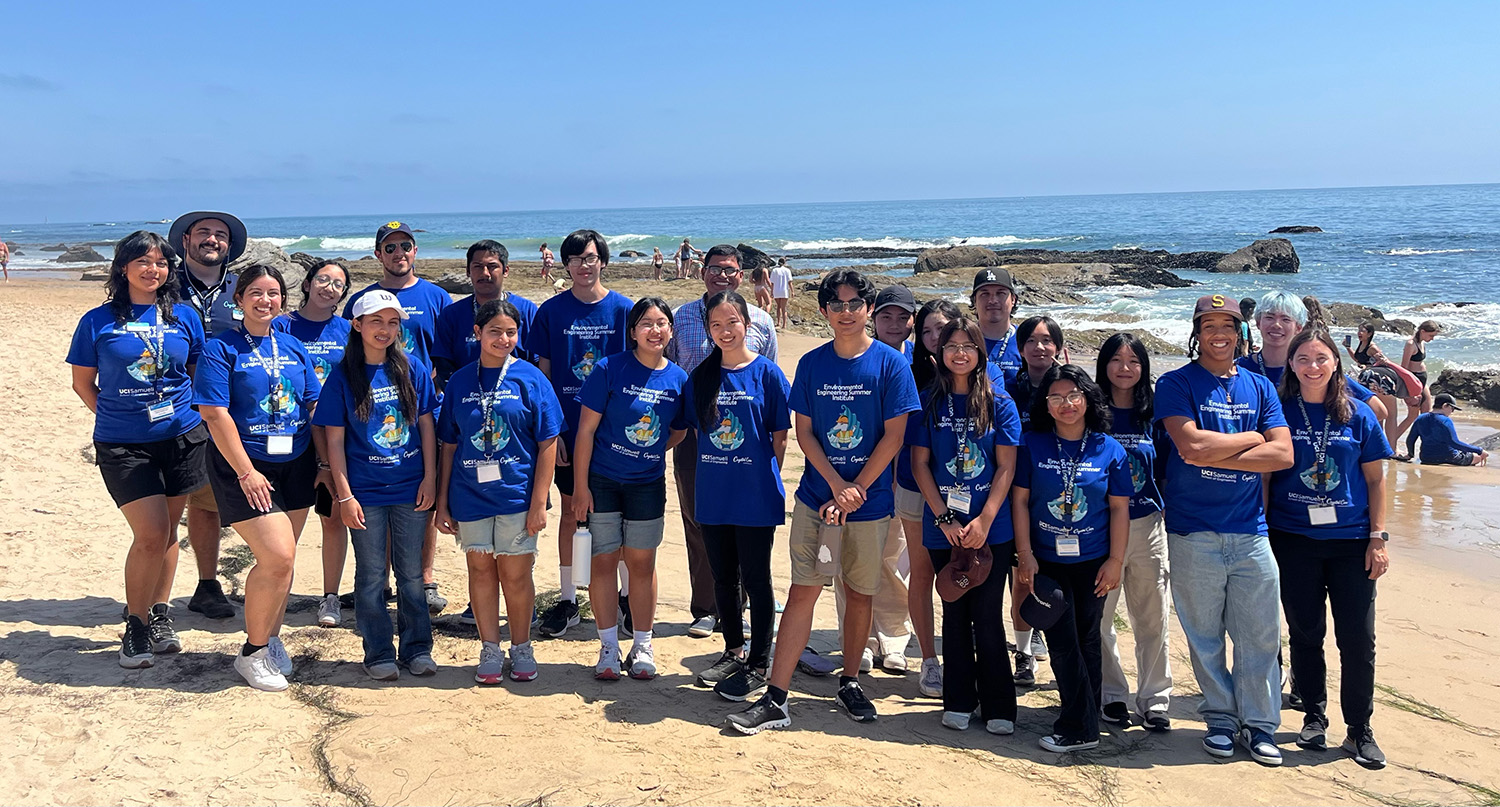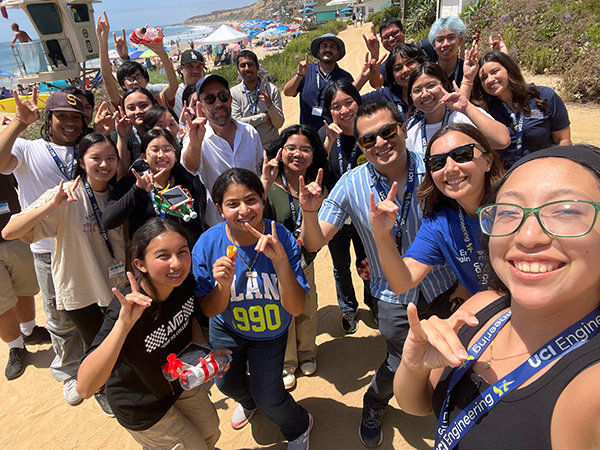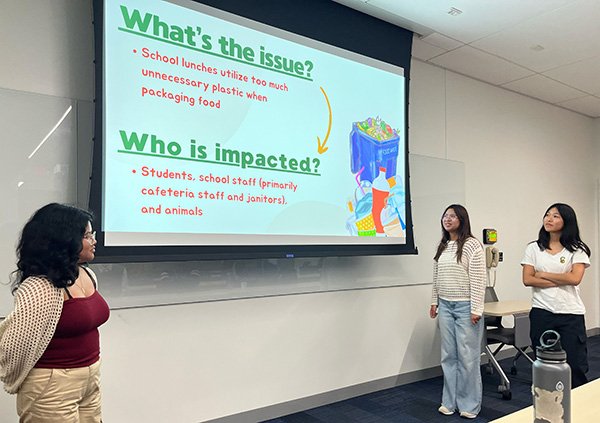
Aug. 2, 2024 - A lucky group of high school students had the opportunity to go to Crystal Cove State Park for a week in July to learn about environmental engineering at a summer program led by the UCI Stacey Nicholas Office of Outreach, Access and Inclusion (OAI) and Crystal Cove Conservancy.
“Our partnership with Crystal Cove Conservancy offers students a unique opportunity to explore engineering in an inspiring natural setting,” said Analía Rao, executive director of OAI. “By engaging with the environment, we hope to spark curiosity and encourage sustainable thinking in the next generation of engineers and scientists.”
The students learned about environmental robots from leading roboticist UCI Samueli School of Engineering Dean Magnus Egerstedt. “I have been very excited to see our collaboration with Crystal Cove take off so when the program for the Environmental Engineering Summer Institute was being assembled, I made sure to insert myself into the agenda,” said Egerstedt. “I got to spend a morning with the students talking about how to use robots for environmental monitoring, and I certainly had a blast.”
Egerstedt showed them how to create their own self-powering motorized robot boats. “I thought robotics was incredible,” said Mariam Ghaly, a sophomore at University High School. The student teams created robotic models using plastic bottles and a solar panel controller to move the boats.

Then they held a boat race on the beach. “That was fun,” Ghaly said. “It didn’t work at first but eventually it did and we got first place!”
Max Huyh, a junior at Westminster High School, also loved the daily hands-on activities. He said he especially liked making their own boat with a solar panel because it allowed them to be creative with their design.
The 13 students learned about beach erosion from Ariane Jong-Levinger of the UCI Flood Lab, Chancellor’s Professor Brett Sander’s leading research center that specializes in beach dynamics. Their “engineering challenge” that day was to create a canal-type infrastructure, a slope with a baking sheet, to study beach loss.
For Westminster High School junior Ivan Dong, that was his favorite engineering activity. “The best part was when we tried to make a natural water channel,” he said. “Max and I used additional sand, sponges and meshes to make it more solid.”
Crystal Cove Conservancy President and CEO Kate Wheeler says holding the camp at the beloved state park is impactful. “We want to bond students with the natural space, protected land and water. By doing this, the park becomes theirs,” she said.
Camp lead instructor Christopher Olivares Martinez, UCI assistant professor of civil and environmental engineering, taught the youth about clean water and showed them how to make stormwater filters using sand, gravel and activated carbon. “It has been wonderful to see students explore their creativity to design their filters, reflect on what worked and didn’t work, and connect with each other,” he said. Throughout the day, the students also enjoyed leisure time at the beach where they could enjoy the pristine beauty of the natural environment at the state park.

Shakira Hobbs, UCI assistant professor of civil and environmental engineering, gave a talk about clean energy and shared how she started BioGals to help a community in Belize with sustainability. “It’s very nice to see just the energy that they have and the passion,” said Hobbs about the students. “They asked a lot of thought-provoking questions.”
The camp also challenged the youth to propose solutions to one of the five grand challenges in environmental engineering for the 21st century: sustainably supply food, water and energy; curb climate change and adapt to its impacts; design a future without pollution and waste; create efficient, healthy, resilient cities; foster informed decisions and actions.
“It was really great to see the students working toward solutions to several environmental grand challenges,” Egerstedt said. Among the creative solutions were bioplastics and a campaign to reduce single-use plastics in cafeteria lunches, using beneficial bacteria to clean up metal pollution in Vietnam, biophilic design of green roofs to reduce CO2 and air pollution in Paramount, California, and integrated policy and alternatives to the pesticide paraquat in Kern County.

The last day was spent at UCI where the students took a campus tour, visited research labs, heard from an undergraduate student panel, learned about the college admission process and enjoyed playing video games at the UCI E-Sports Arena. The program culminated with participants giving final presentations to an audience full of family members, faculty and staff.
A week under the sun with environmental engineers can be life changing. “I had a lot of fun and this showed me ways people are trying to improve the environment and that’s inspiring to me,” said Garden Grove High School junior Emily Nguyen. “Meeting these people who are succeeding in this field inspires me to go in that direction.”
“I’m interested in the environment and engineering,” said Westminster High School junior Hayde Perez whose team was called Future Engineers. “Learning about how environmental engineers can help the world made me more interested. I’ll probably pursue this path.”
“The summer programs show students pathways to careers, interests and pursuits they might not have thought were possible. It shows them how they can contribute to places like Crystal Cove that need protecting,” said Wheeler. “There’s potential huge impact on an incredibly diverse community of young people who can help combat environmental issues that affect us all.”
- Natalie Tso

